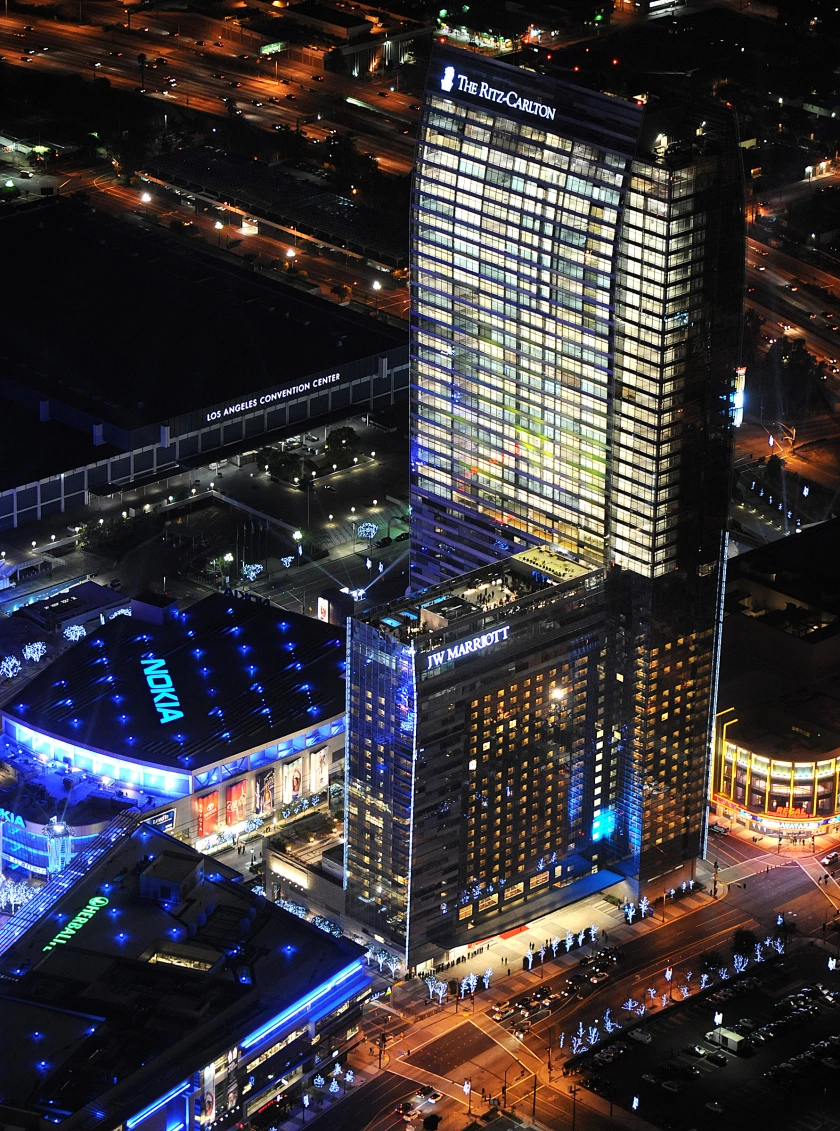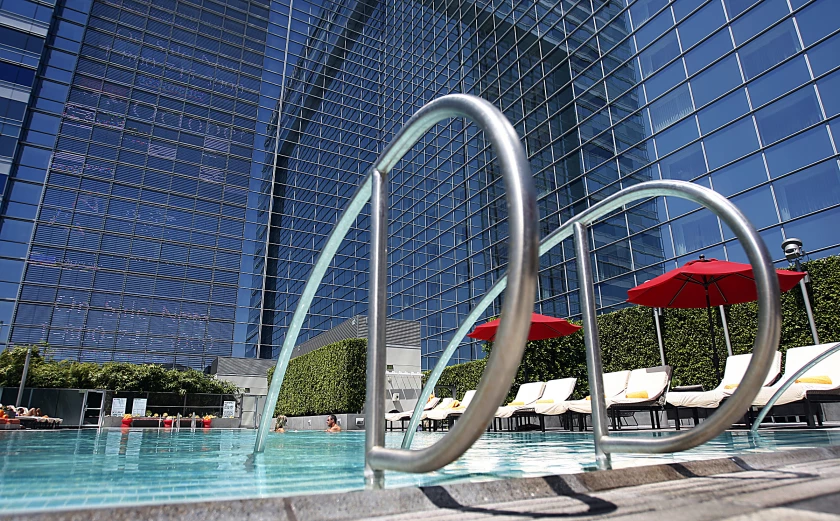AEG to sell stake in L.A. Live hotels as the lodging industry recovers
 An aerial view of the Ritz-Carlton and Marriott hotels in downtown Los Angeles during a lighting ceremony in 2010.(Wally Skalij / Los Angeles Times)
An aerial view of the Ritz-Carlton and Marriott hotels in downtown Los Angeles during a lighting ceremony in 2010.(Wally Skalij / Los Angeles Times)
Roger Vincent
Los Angeles Times
January 24, 2022
Entertainment giant AEG plans to raise hundreds of millions of dollars to help fund a planned expansion of the L.A. Live hospitality complex in downtown Los Angeles by selling part ownership in the Ritz-Carlton and JW Marriott hotels there.
AEG said Monday that it hopes to take advantage of a recent rebound in hotel prices and find an investor who wants a big piece of the primary hotels for one of the country’s busiest venues for sports, music and other entertainment events.
AEG completed the hotels in 2010 at a cost of about $1 billion. Its leaders are willing to sell more than a 50% ownership stake, which would give the new owner control of the property where Marriott International Inc. manages two of its top brands, Ritz-Carlton and JW Marriott, in joined buildings with a combined 1,001 rooms and 134,000 square feet of meeting space.
AEG is looking for a partner with deep experience in the hotel industry, Vice Chairman Ted Fikre said. “Hotel operation is not our core business.”
Money raised by the sale will be used to help pay for a long-planned expansion of the JW Marriott that was stalled by the pandemic, he said, and to invest in several of AEG’s business units, including ticketing and live entertainment such as music festivals and concert tours. The company owns, manages or consults with stadiums, arenas and convention centers in several countries, including China, Germany and Britain.
In 2018, AEG proposed a
$700-million addition to the hotel complex to include a 37-story hotel tower with 861 rooms. (The cost of the addition has since risen to $800 million.) It would be built just south of L.A. Live’s Regal cinemas and would be connected by pedestrian bridges to the existing JW Marriott.
The hotel expansion would also add 150,000 square feet of meeting space, including a 51,000-square-foot ballroom that AEG says would be the largest in Los Angeles. AEG is working on getting city approval for the project and hopes to start construction within the next 12 months, Fikre said.
 The pool deck of the JW Marriott/Ritz-Carlton Hotel in downtown Los Angeles is seen in 2012.(Luis Sinco / Los Angeles Times)
The pool deck of the JW Marriott/Ritz-Carlton Hotel in downtown Los Angeles is seen in 2012.(Luis Sinco / Los Angeles Times)
AEG’s hotel addition is intended to happen in tandem with a $500-million expansion of the Los Angeles Convention Center that would create about 800,000 square feet of contiguous exhibition space, a key measure that would make it more competitive with other big convention venues in the country. That project is still in planning phases.
The timing for a sale is opportune because the hotel market rebounded last year as investors bet on the return of travelers as pandemic restrictions ease, real estate broker John Strauss of JLL said.
“By 2023 and 2024 we should see the semblance of normalcy as effects of the pandemic wane in the economy and marketplace,” said Strauss, who represents AEG.
Hotel sales exceeded $38 billion last year, according to JLL, up 395% from 2020 when the pandemic virtually froze travel for months and threatened to put hoteliers out of business. The Ritz-Carlton and JW Marriott were among the hotels that temporarily closed.
The current bounce back in sales “is even more amazing on the heels of the deepest recession we have ever encountered in the hotel business,” said hospitality consultant Alan Reay, who is not involved in the AEG property sale. “To have a rebound of this quality and this high is astounding.”
In California, most of the big sales recently have been at coastal resorts and other properties leisure travelers can drive to, Reay said. The 59-room Alila Ventana Big Sur sold for $150 million in November, a record price per room for the state.
Sales of hotels that rely on business and convention travelers has lagged, he said. The 170-room Westin San Jose in the city’s downtown recently sold for $45 million, a steep discount from its 2017 sale price of $64 million.
Hotels lost a collective $111.8 billion in room revenue alone during 2020 and 2021, the American Hotel & Lodging Assn. said in a report released Monday, but projected occupancy rates and room revenue will approach 2019 levels this year.
Leisure travelers will continue to drive the recovery, the trade association said. In 2019, business travelers accounted for 52.5% of room revenue. In 2022, they’re projected to account for 43.6% of the total.
The Ritz-Carlton and JW Marriott are unusual for a city center hotel in that they serve “one of the most successful sports and entertainment venues in the world” as well as the convention center, Strauss said. “There is no other venue like it in the Western United States.”
Potential buyers capable of bidding the price into hundreds of millions of dollars include real estate investment trusts, private equity investors, sovereign wealth funds from other countries and wealthy individuals.
“This is the largest luxury global hotel offering in the post-COVID era,” Strauss said.



